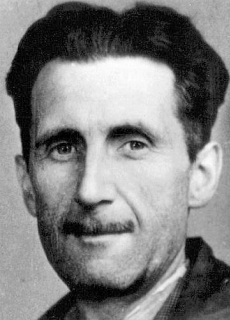
George Orwell (1903-1950) is commonly considered one of the greatest writers and journalists of the twentieth century, often due to the way in which he was able to look right into the heart of totalitarianism (a political system in which the state can exert power over its people in any way it chooses) and show it up for all the world to see. But, despite being known as a great English writer, he was born in India as Eric Arthur Blair, since his father, Richard Walmesley Blair was a colonial civil servant for the British Empire. Then in his childhood he was sent to England so as to be educated at Britain’s most well-renowned public school, Eton.
Despite his education, Orwell did not go to the University of Oxford or Cambridge as many of his peers would have done. In fact, he didn’t opt to study for a degree at all, instead going into a similar line of work as his father, by joining the Indian Imperial Police in Burma – a country which clearly had an influence upon him, since his time there formed the basis of his first novel Burmese Days, as well as two essays: “A Hanging” and “Shooting an Elephant”.
In 1927 he left his post in the Imperial Police and returned to England so as to become a writer. Having taken up lodgings in London, Orwell found himself wondering around the poorer areas of the city, forming an interest in the lives of the destitute and impoverished which eventually led him to write his first book, Down and Out in Paris and in London, published in 1933.
In his earlier years, Orwell positioned himself as an anarchist (someone who wants society to be without a formal state or government), but by the 1930s he had become more of a democratic socialist (believing that certain parts of the economy, such as the railways, electricity companies etc. should be owned by the people) – though he always pertained to anarchism’s focus on individual liberty. His political persuasion was further informed by his travelling to fight in the Spanish Civil War in 1936, on the side of the Republicans, against the fascist Nationalists led by Francisco Franco. However, the left-wing militias which fought on the side of the Republics became increasingly divided, with the Stalinist groups becoming increasingly leading attacks on the more moderate socialist groups, leading Orwell to abandon the war and return to England a staunch anti-Stalinist.
His experiences in colonial Burma and in Spain quite possibly helped him to, as one scholar of Orwell puts it, “diagnose correctly the three main problems of his time, which were Stalinism and fascism and imperialism”. This made him an outsider to the British political left of the time, who, while aware of the evils of the far-right fascists, found it uncomfortable dealing with evils on their side of the political spectrum. Some were even sympathetic to the form of rule undertaken in the Soviet Union by Stalin – a man who had millions of his own people killed.
Orwell had little difficulty in being both anti-fascist and anti-Soviet Union, since he was always uncompromisingly anti-totalitarian, born out of a love of freedom which could not be quashed. It was this unwavering outlook of his which led him to write what would become his most famous novel 1984, published in 1949, in which he envisioned a the ultimate totalitarian society, where the individual was under constant control and monitoring by the state. By creating new words and concepts such as “thoughtcrime” (forms of thought which illegally question the state), “Newspeak” (a controlled form of language designed to prevent independent thought) and the “memory hole” (holes down which articles of history were placed so that they may be forgotten) he shone a light on the key facets of totalitarian thinking. The novel has retrospectively become a crucial manual for identifying the presence of totalitarian thinking in the real world.
In spite of this literary achievement, Orwell died less than a year later in 1950 from tuberculosis, aged only 46. His writing, however, lives on.
Image: https://commons.wikimedia.org/wiki/File:George_Orwell_press_photo.jpg

0 Comment:
Be the first one to comment on this article.